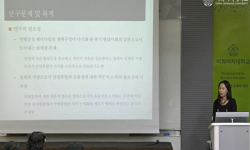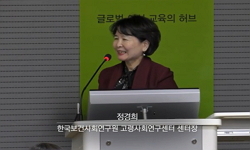The wage system of public institutions in Korea is operated based on seniority-based, and additionally adopted performance-based salaries, peak wages, and job-based wage system. They were introduced as part of efforts to enhance productivity and effic...
http://chineseinput.net/에서 pinyin(병음)방식으로 중국어를 변환할 수 있습니다.
변환된 중국어를 복사하여 사용하시면 됩니다.
- 中文 을 입력하시려면 zhongwen을 입력하시고 space를누르시면됩니다.
- 北京 을 입력하시려면 beijing을 입력하시고 space를 누르시면 됩니다.

공공기관 종사자의 임금제도 수용성: 연령별・성별 인식 차이를 중심으로 = Acceptance of the wage system for public institutions’ employees: Focusing on age and gender perception differences
한글로보기https://www.riss.kr/link?id=A108788471
- 저자
- 발행기관
- 학술지명
- 권호사항
-
발행연도
2023
-
작성언어
Korean
-
주제어
임금체계 ; 공공기관 ; 연령 ; 성별 ; 수용성 ; wage system ; public institutions ; age ; gender ; acceptance
-
등재정보
KCI등재
-
자료형태
학술저널
- 발행기관 URL
-
수록면
31-59(29쪽)
- 제공처
-
0
상세조회 -
0
다운로드
부가정보
다국어 초록 (Multilingual Abstract)
The wage system of public institutions in Korea is operated based on seniority-based, and additionally adopted performance-based salaries, peak wages, and job-based wage system. They were introduced as part of efforts to enhance productivity and efficiency in the public sector. In contrast to an equivalent wage system, a differentiated compensation system based on employees' efforts and responsibilities has been strengthened. Ensuring the acceptance of introduced systems is a crucial factor for the stable operation of the system. This study analyzed the level of acceptance among public institution employees through a survey and identified factors that influence the differences in acceptance. Our variables of interest, such as age and gender, showed variations in acceptance for individual systems, and other factors such as employment type and organizational type also had an effects. Based on these findings, the important thing in adoption of wage system is the need for consensus among employees. It is suggested that in order to improve acceptance, procedural fairness and transparency in the introduction and operation must be secured.
동일학술지(권/호) 다른 논문
-
조직 내 의사소통이 공공기업가정신에 미치는 영향: 변혁적리더십의 조절효과를 중심으로
- 한국인사행정학회
- 권신우
- 2023
- KCI등재
-
개인의 역할모호성과 조직의 목표명확성이 조직성과와 업무성과에 미치는 영향 연구: P-J fit과 P-O fit의 매개효과를 중심으로
- 한국인사행정학회
- 이가빈
- 2023
- KCI등재
-
공무원 성과 인식 영향 요인에 대한 탐색적 연구: 개인의 성과인식을 중심으로
- 한국인사행정학회
- 박순애
- 2023
- KCI등재
-
해양경찰공무원의 조직효과성 인식에 대한 영향요인 연구: 수색구조요원의 직무특성을 중심으로
- 한국인사행정학회
- 전봉조
- 2023
- KCI등재




 스콜라
스콜라





